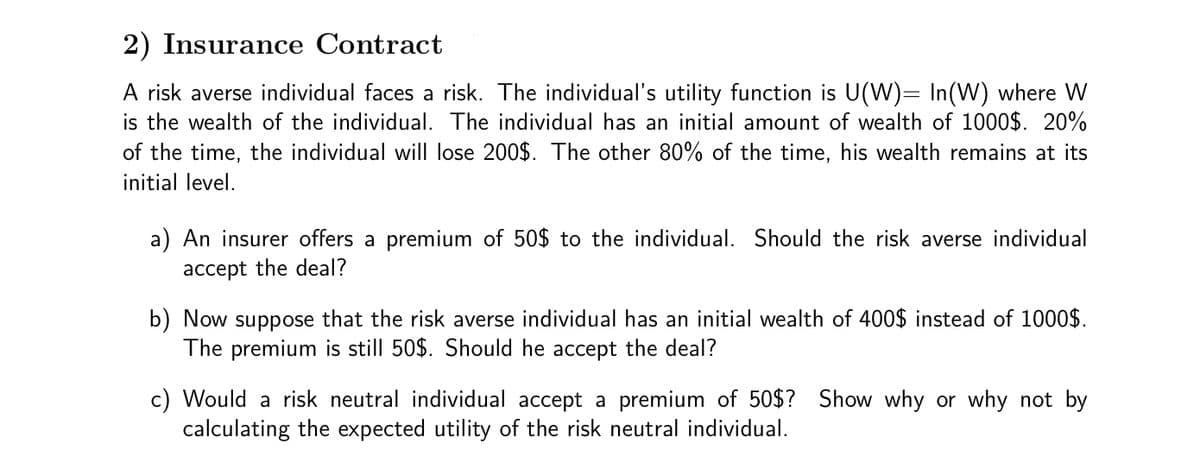A risk averse individual faces a risk. The individual's utility function is U(W)= In(W) where W is the wealth of the individual. The individual has an initial amount of wealth of 1000$. 20% of the time, the individual will lose 200$. The other 80% of the time, his wealth remains at its initial level. a) An insurer offers a premium of 50$ to the individual. Should the risk averse individual accept the deal? b) Now suppose that the risk averse individual has an initial wealth of 400$ instead of 1000$. The premium is still 50$. Should he accept the deal? c) Would a risk neutral individual accept a premium of 50$? Show why or why not by calculating the expected utility of the risk neutral individual.
A risk averse individual faces a risk. The individual's utility function is U(W)= In(W) where W is the wealth of the individual. The individual has an initial amount of wealth of 1000$. 20% of the time, the individual will lose 200$. The other 80% of the time, his wealth remains at its initial level. a) An insurer offers a premium of 50$ to the individual. Should the risk averse individual accept the deal? b) Now suppose that the risk averse individual has an initial wealth of 400$ instead of 1000$. The premium is still 50$. Should he accept the deal? c) Would a risk neutral individual accept a premium of 50$? Show why or why not by calculating the expected utility of the risk neutral individual.
Chapter16: Labor Markets
Section: Chapter Questions
Problem 16.9P
Related questions
Question

Transcribed Image Text:2) Insurance Contract
A risk averse individual faces a risk. The individual's utility function is U(W)= In(W) where W
is the wealth of the individual. The individual has an initial amount of wealth of 1000$. 20%
of the time, the individual will lose 200$. The other 80% of the time, his wealth remains at its
initial level.
a) An insurer offers a premium of 50$ to the individual. Should the risk averse individual
accept the deal?
b) Now suppose that the risk averse individual has an initial wealth of 400$ instead of 1000$.
The premium is still 50$. Should he accept the deal?
c) Would a risk neutral individual accept a premium of 50$? Show why or why not by
calculating the expected utility of the risk neutral individual.
Expert Solution
This question has been solved!
Explore an expertly crafted, step-by-step solution for a thorough understanding of key concepts.
Step by step
Solved in 2 steps

Knowledge Booster
Learn more about
Need a deep-dive on the concept behind this application? Look no further. Learn more about this topic, economics and related others by exploring similar questions and additional content below.Recommended textbooks for you


Essentials of Economics (MindTap Course List)
Economics
ISBN:
9781337091992
Author:
N. Gregory Mankiw
Publisher:
Cengage Learning

Brief Principles of Macroeconomics (MindTap Cours…
Economics
ISBN:
9781337091985
Author:
N. Gregory Mankiw
Publisher:
Cengage Learning


Essentials of Economics (MindTap Course List)
Economics
ISBN:
9781337091992
Author:
N. Gregory Mankiw
Publisher:
Cengage Learning

Brief Principles of Macroeconomics (MindTap Cours…
Economics
ISBN:
9781337091985
Author:
N. Gregory Mankiw
Publisher:
Cengage Learning